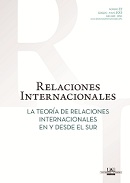Keywords:
International Relations Theory, West, epistemology, sociology of knowledgeCopyright (c) 2013 Arlene B. TICKNER, David L. BLANEY

This work is licensed under a Creative Commons Attribution-NonCommercial-NoDerivatives 4.0 International License.
Abstract
A host of voices has risen to challenge Western or core dominance of the field of International relations (IR). That the field is indifferent to scholarly practices and policy issues outside the core and even dismissive of them, and that its primary conceptual tools, analytical categories, and concepts are ill-equipped for understanding many of today’s key global problems, is disputed by shockingly few scholars, even those that represent the “mainstream”. And yet, the core-periphery structure that governs the apparatus of intellectual production in IR has proven relatively immune to these charges.





